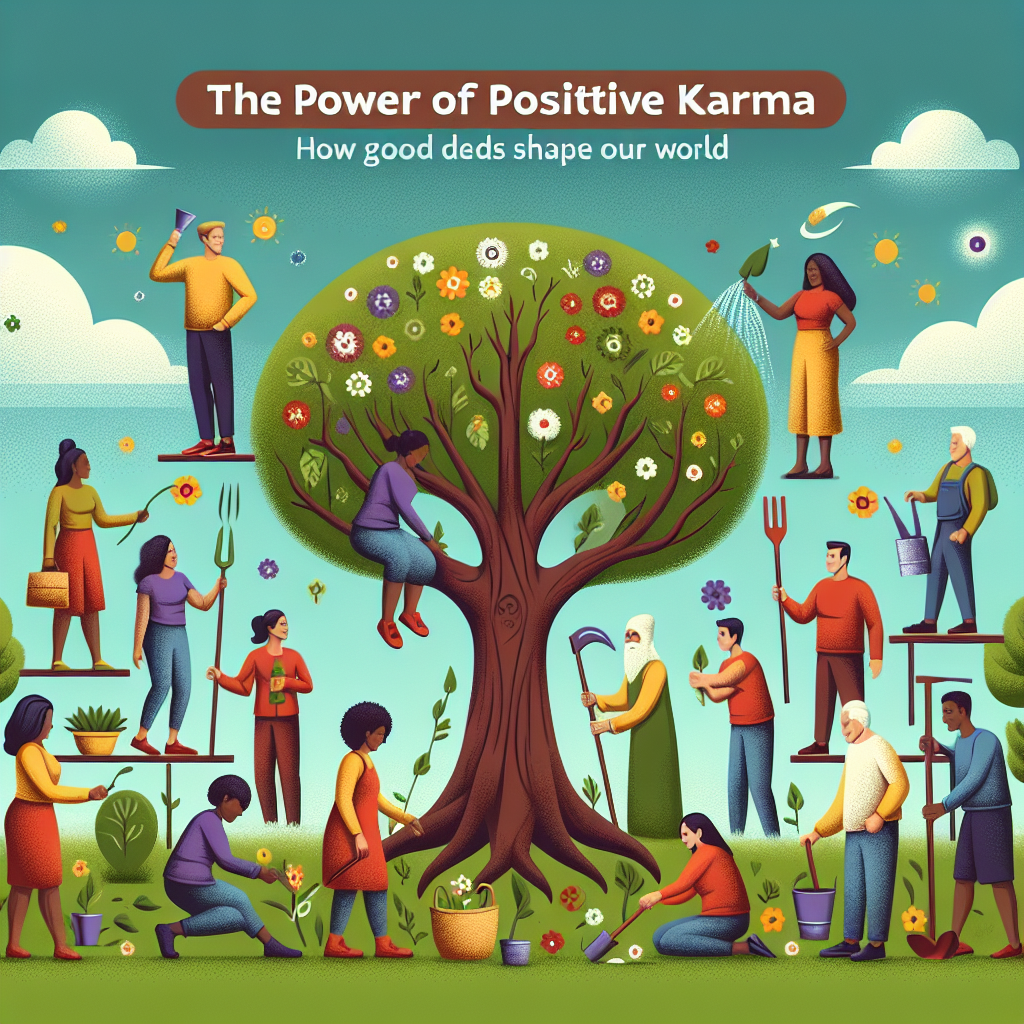Karma is a concept that transcends cultural boundaries and resonates deeply within numerous belief systems around the world. At its core, karma suggests that the actions we take—whether good or bad—have consequences that extend beyond our immediate experience. This age-old principle offers profound insights into the impact of our deeds not only on ourselves but on the world at large. In this article, we will explore the nature of positive karma, how good deeds can shape our lives and society, and share real-life examples that illustrate this powerful concept.
Understanding Karma
Karma is derived from the Sanskrit word ‘karman’, which means "action." It is often simplified to the idea that "what goes around comes around." In essence, it posits that every action generates a force of energy that returns to us in some way. This energy can be positive or negative, largely contingent upon the nature of our actions.
While the notion of karma is rooted in Eastern philosophy, it resonates with principles found in various ethical frameworks, such as the Golden Rule: treat others as you wish to be treated. Across cultures, these principles advocate for kindness, compassion, and altruism, emphasizing that our interactions shape our destinies.
The Ripple Effect of Good Deeds
Engaging in good deeds, however small, contributes to what can be termed as the "ripple effect" of positive karma. This concept illustrates how a single act of kindness can inspire others, resulting in widespread positive change.
For example, imagine a stranger helping another in a moment of need, such as:
-
Assisting an Elderly Person: A young woman helps an elderly man cross a busy street. Grateful for the assistance, the man later offers his help to a neighbor struggling with groceries. This chain reaction continues, fostering a community spirit of cooperation and compassion.
- Donating to Charity: A local business owner decides to donate a portion of their monthly earnings to a charity. Inspired by this act, other businesses in the vicinity join in, resultantly raising significant funds for the cause and strengthening community ties.
These examples illustrate how individual good deeds can create a ripple effect, transforming the behavior and attitudes of others, consequently shaping societal values and norms.
Psychological Benefits of Good Deeds
Engaging in acts of kindness can significantly improve one’s psychological well-being. Many studies have shown that performing good deeds releases endorphins in the brain, often referred to as the "helper’s high." This phenomenon is characterized by feelings of happiness and satisfaction that arise from making a positive impact.
-
Increased Happiness: Individuals who regularly perform acts of kindness often report higher levels of happiness. This sense of fulfillment can lead to improved mental health and resilience against stress and depression.
-
Building Connections: Good deeds can strengthen relationships and foster trust within communities. When individuals engage in altruistic acts, it creates bonds that can lead to social networks of support.
- Boosting Self-Esteem: Engaging in acts of kindness can improve one’s self-esteem and sense of purpose. Knowing that your actions can positively affect others reinforces a sense of value and significance in our lives.
Good Deeds in the Digital Age
In today’s hyper-connected world, the power of positive karma has proliferated through social media and online platforms. The ability to share good deeds and stories of kindness has created an environment where altruism is amplified—encouraging more individuals to partake in acts of generosity.
-
Social Movements: Platforms like Twitter, Instagram, and Facebook have empowered ordinary individuals to start movements that bring attention to social issues, encouraging collective action for change.
-
Crowdsourcing Help: Websites like GoFundMe and Kickstarter allow people to support each other financially for various causes and needs, from medical emergencies to creative projects, exemplifying how technology can facilitate goodwill.
- Viral Kindness: Viral challenges focused on acts of kindness encourage people to engage in altruistic behaviors, thereby creating a shared culture that celebrates positive actions.
The Global Impact of Positive Karma
The cumulative effect of good deeds on a global scale cannot be overstated. When individuals and communities make concerted efforts to embody the principle of positive karma, it can lead to monumental changes.
-
Philanthropic Movements: Wealthy individuals and corporations who prioritize social responsibility invest in charities, sustainable practices, and community development can result in systematic change that benefits marginalized communities.
-
Environmental Stewardship: Acts of kindness toward the environment, such as tree-planting initiatives, clean-up drives, and conservation efforts, contribute to a healthier planet. Collective efforts in environmental activism can yield significant benefits for future generations.
- Global Peace Initiatives: Organizations and individuals advocating for peace, justice, and equality can create lasting positive changes in societies long plagued by discord and inequity. These efforts showcase the essential connection between individual actions and collective global outcomes.
Conclusion
The power of positive karma extends far beyond the individual; it ripples through communities, organizations, and even nations. By fostering a culture of kindness, compassion, and altruism, we can manifest a world that speaks to the innate goodness within humanity. Each good deed has the potential to inspire a chain reaction, creating a world where positivity prevails, and individuals work together to uplift one another.
Ultimately, the question is not just about what we do for ourselves, but how our actions affect the larger tapestry of life. By consciously choosing to engage in positive deeds, we harness the power of karma to shape not only our lives but the future of our world.
FAQs
1. What exactly is karma?
Karma is a spiritual principle that suggests that all actions have consequences, which can manifest positively or negatively based on the nature of those actions.
2. How do good deeds influence my life?
Good deeds can enhance your psychological well-being, improve social relationships, and cultivate a sense of purpose and fulfillment in life.
3. Can acts of kindness have global effects?
Yes, collective acts of kindness can lead to significant change, such as philanthropic initiatives, environmental efforts, and movements for social justice.
4. How can I practice positive karma in my daily life?
You can practice positive karma by engaging in small acts of kindness, helping others in need, volunteering, or simply spreading positivity to those around you.
5. What are some examples of acts of kindness?
Acts of kindness may include offering help to a stranger, donating to charity, volunteering time at a local shelter, or complimenting someone to brighten their day.
6. Is there a difference between secular and spiritual interpretations of karma?
While secular perspectives often view karma in terms of ethical consequences in a societal context, spiritual interpretations connect it to notions of rebirth and the cycle of life, often seeking balance and moral righteousness.
It looks like you entered “Prompt,” but I’m not sure what specific assistance or topic you’re looking for. Could you clarify or provide more details about what you need help with? Whether it’s writing, brainstorming ideas, or anything else, I’m here to help!, #Power #Positive #Karma #Good #Deeds #Shape #World, #Power #Positive #Karma #Good #Deeds #Shape #World, 1735344481, the-power-of-positive-karma-how-good-deeds-shape-our-world





